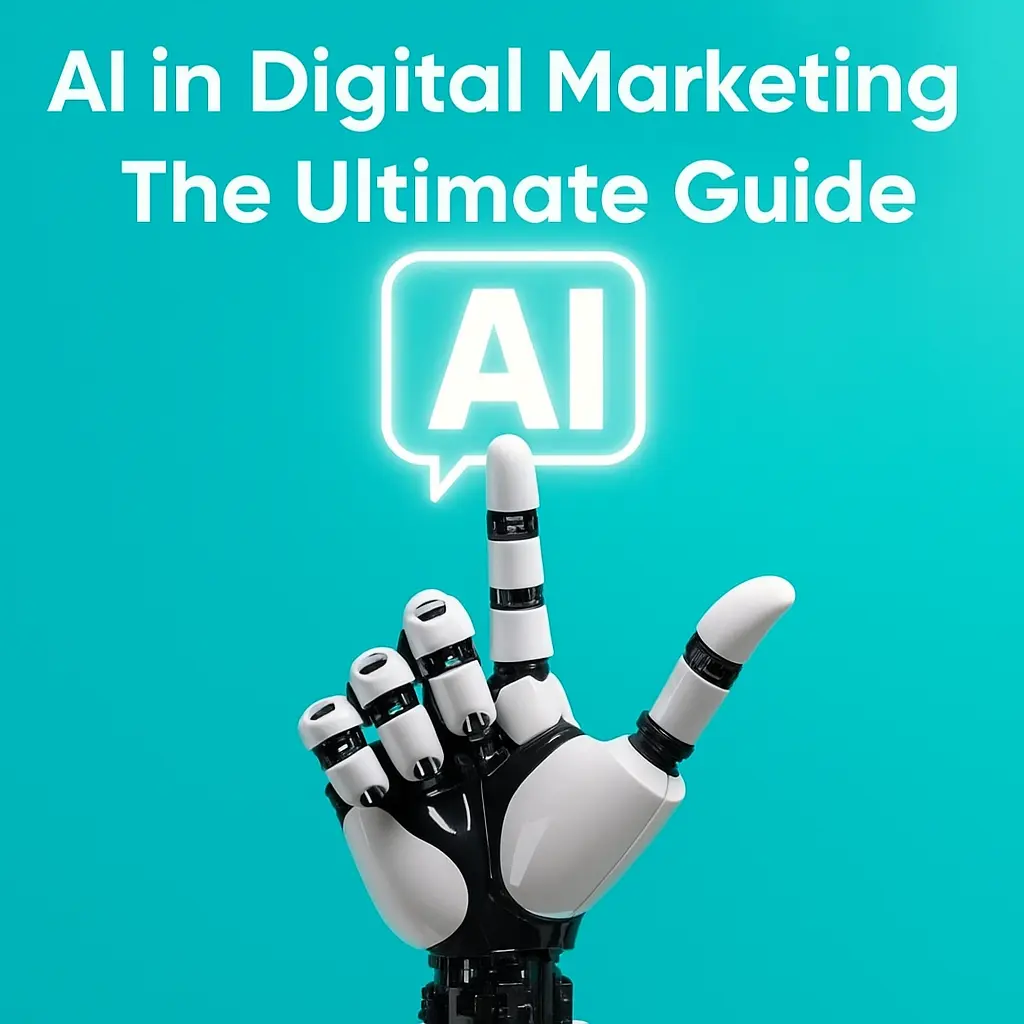Table of Contents
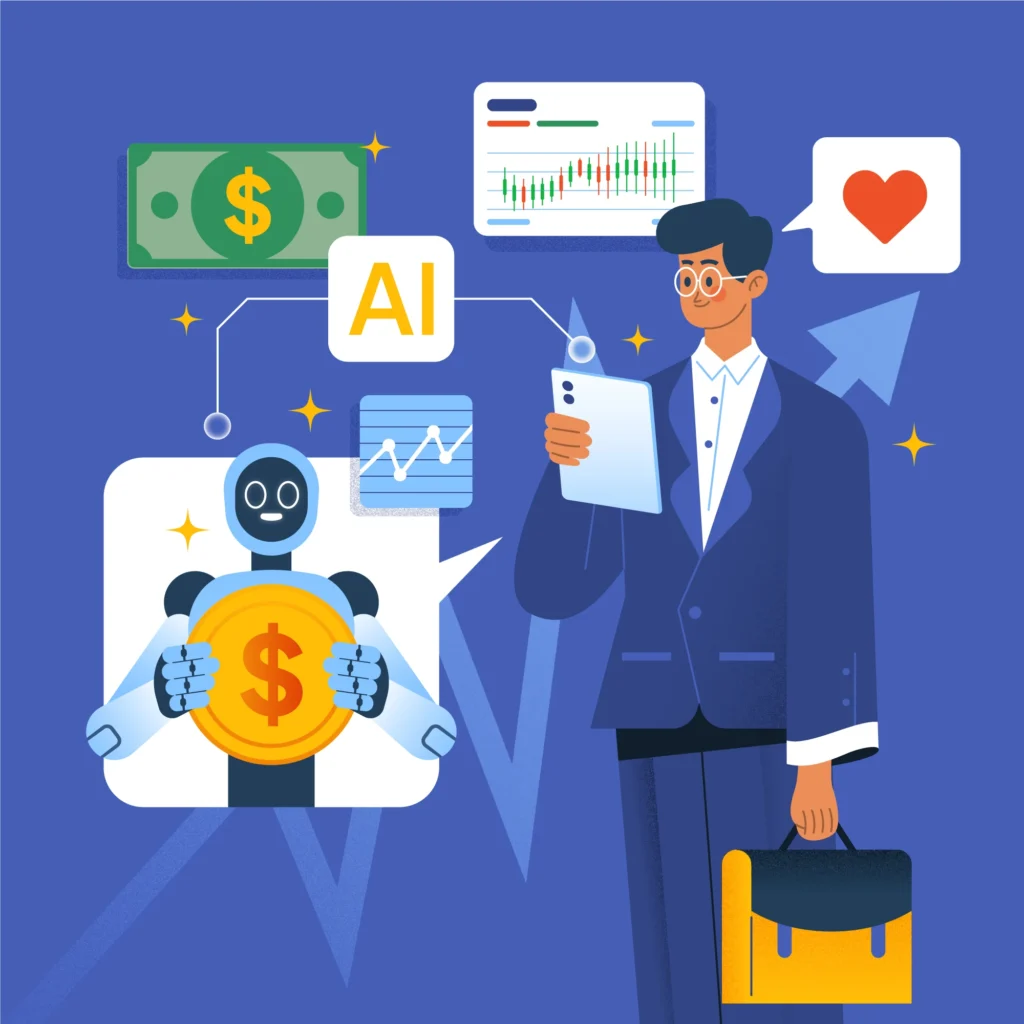
Introduction
In today’s fast paced digital world, staying ahead of the competition means embracing innovation and one of the biggest game-changers is AI in digital marketing. From personalized content to predictive analytics, AI for digital marketing is reshaping how brands connect with their audiences and make data-driven decisions.
Whether you’re a startup owner, a digital marketer, or a business looking to scale, understanding the role of AI in marketing can unlock powerful new opportunities. By automating tasks, analyzing consumer behavior, and delivering targeted content, digital marketing with AI is no longer just a trend, it’s a necessity.
In this ultimate guide, we’ll explore how AI digital marketing is transforming strategies in 2025, the best tools to get started, real-world applications, and how your business can benefit today.
Whether you’re just starting out or looking to scale, our digital marketing services can help you implement AI powered strategies that drive real results.
— Andrew Ng (Co-founder of Google Brain)
“AI is the new electricity“
What is AI in Digital Marketing?
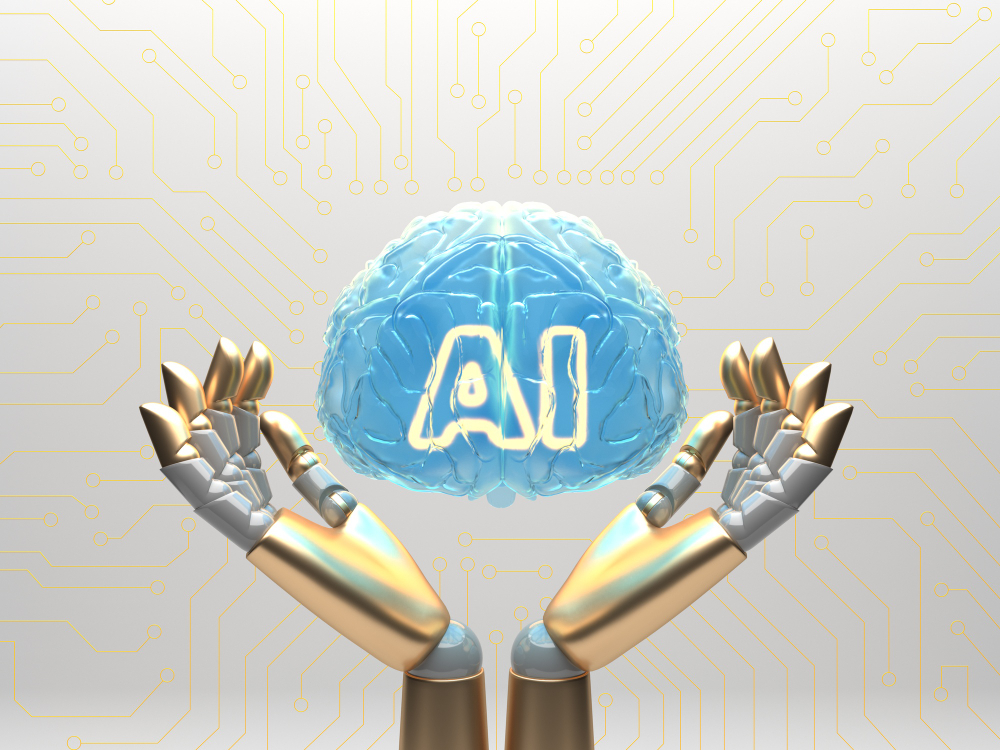
Artificial Intelligence (AI) in digital marketing refers to the use of smart technologies that can analyze data, predict trends, and automate marketing tasks. Instead of relying only on manual input, AI digital marketing leverages machine learning, natural language processing, and data analytics to make more accurate, real-time decisions.
Whether it’s chatbots handling customer queries, tools that write optimized content, or systems that predict customer behavior, the role of AI in marketing is to enhance efficiency and improve personalization at scale.
At its core, digital marketing with AI helps brands create better customer experiences, improve campaign performance, and gain deeper insights all while saving time and resources.
Benefits of Using AI in Digital Marketing
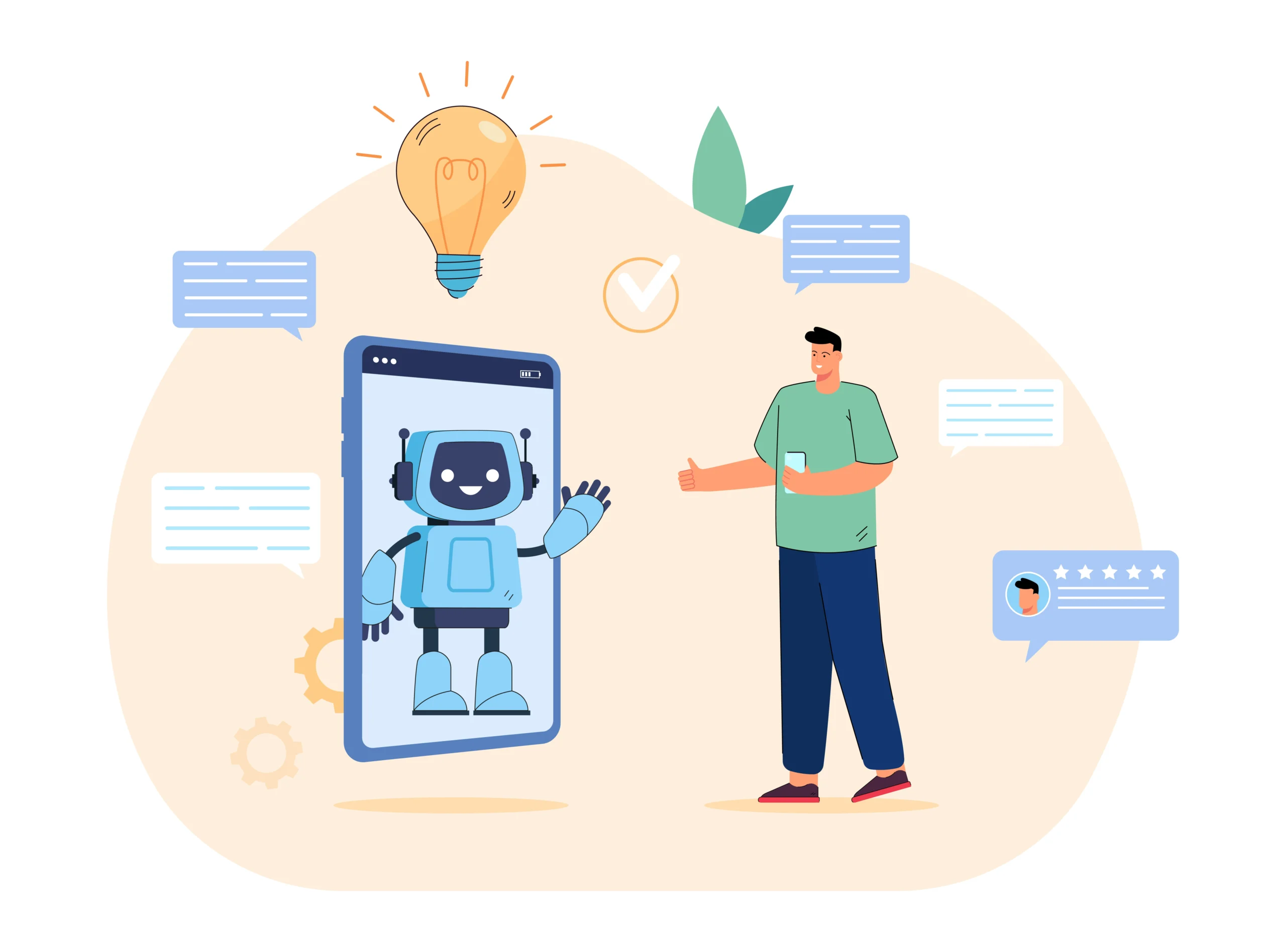
As the digital landscape becomes more competitive, small businesses are constantly looking for smarter ways to connect with their audience. This is where AI in digital marketing for businesses shines by helping brands stay relevant, responsive, and results driven.
Here are the key benefits of using AI for digital marketing:
1. Enhanced Personalization
AI helps create highly personalized experiences by analyzing user behavior, purchase history, and preferences in real time. With AI for marketers, it’s now possible to deliver the right message to the right person at the right moment.
2. Improved Efficiency and Automation
Repetitive tasks like sending emails, posting on social media, or segmenting audiences can now be automated with AI tools for digital marketing. This allows marketers to focus more on strategy and creativity.
3. Smart Decision-Making
AI can process massive volumes of data to uncover trends and insights that are otherwise difficult to identify. This empowers digital marketing with AI to be more predictive, helping businesses make informed decisions.
4. Better ROI on Campaigns
By targeting the right audience and optimizing ads in real time, AI digital marketing improves the performance of marketing campaigns while reducing spends.
5. Real-Time Customer Support
AI powered chatbots provide instant support, reducing wait times and improving customer satisfaction. It’s one of the most popular and cost effective applications of AI for marketers today.
Role of AI in Marketing
The role of AI in marketing is no longer limited to automation—it now plays a central part in decision making, strategy building, and customer engagement. As digital marketing becomes increasingly data driven, AI helps brands act on insights with speed and accuracy that humans alone can’t match.
Here’s how AI contributes to modern marketing at different levels:
1. Data Analysis and Insight Generation
AI tools process massive amounts of customer data from multiple sources websites, social media, emails to uncover patterns, preferences, and buying behavior. This helps marketers make smarter, real time decisions.
2. Customer Journey Mapping
By tracking how users interact with your brand across platforms, AI in digital marketing helps map the entire customer journey. This allows for more personalized touchpoints and higher conversion rates.
3. Content Optimization
AI can recommend what kind of content to create, when to post it, and how to optimize it based on audience engagement. This ensures your message reaches the right people at the right time.
4. Marketing Automation
From scheduling social media posts to sending triggered email sequences, digital marketing with AI streamlines repetitive tasks so marketers can focus on strategy and creativity.
5. Predictive Behavior Modeling
AI can predict which users are most likely to convert, unsubscribe, or engage. This allows businesses to target audiences more effectively and reduce marketing waste.
6. Real-Time Personalization
One of the most valuable roles of AI digital marketing is delivering tailored experiences be it dynamic website content, product suggestions, or email subject lines based on each user’s behavior.
Best AI Tools for Digital Marketing in 2025
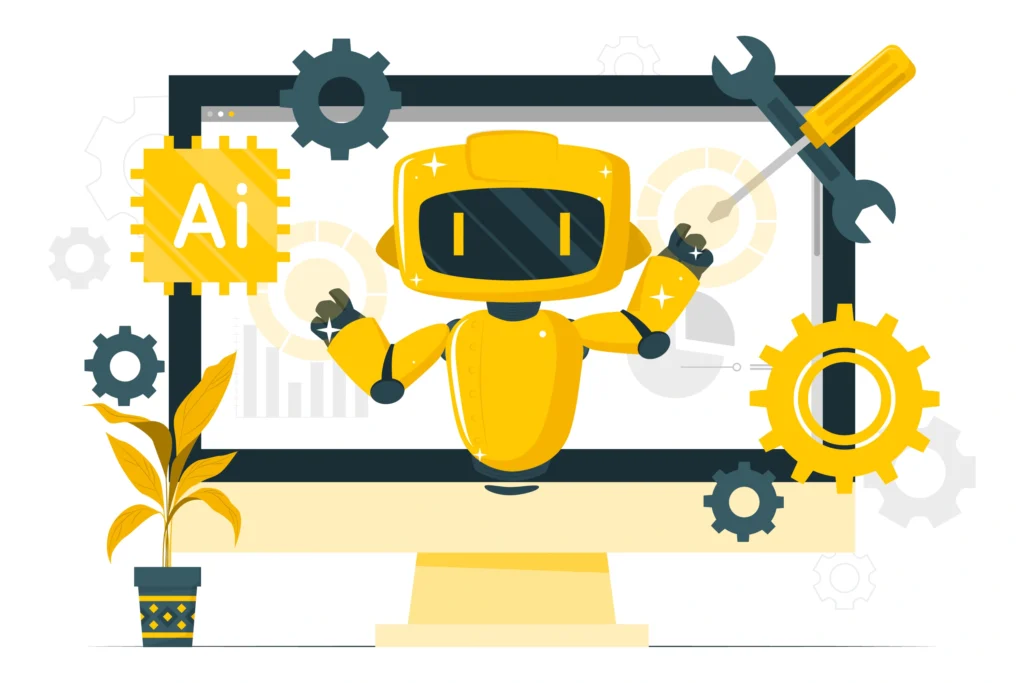
As the demand for AI in digital marketing grows, so does the number of tools designed to simplify and scale your efforts. Whether you’re looking to improve local SEO for small businesses, automate emails, or create high converting content, there’s an AI powered solution available.
Here’s a list of some of the most popular and effective tools for AI digital marketing in 2025:
1. Jasper AI – Content Writing & Copywriting
Jasper helps marketers generate blog posts, ad copy, email content, and more. It’s great for speeding up content creation while maintaining quality and tone.
2. ChatGPT – Content, Ideas & Chatbots
From brainstorming content topics to answering customer queries, ChatGPT is a versatile AI tool that’s changing how digital marketing with AI is done.
3. SurferSEO – SEO Optimization
Surfer combines AI and data to help you write SEO optimized content based on real time SERP analysis. It suggests keyword placement, structure, and word count.
4. Copy.ai – AI for Social Media & Ads
Perfect for creating quick captions, ad headlines, product descriptions, and more. A favorite among social media marketers.
5. Grammarly – AI Writing Assistant
Beyond grammar and spelling, Grammarly uses AI to improve clarity, tone, and engagement making every piece of content more effective.
6. Mailchimp + AI – Email Automation
Mailchimp’s AI features suggest the best send times, segment lists, and recommend content for better email marketing performance.
7. HubSpot AI – CRM & Marketing Automation
HubSpot’s AI helps with lead scoring, content suggestions, and smart workflows, making it an all in one solution for AI digital marketing needs.
8. Canva AI – Visual Content Creation
Canva now integrates AI to help with design suggestions, automatic resizing, and even content generation for posts and ads.
These digital marketing tools are helping businesses of all sizes harness the power of AI for digital marketing—making campaigns smarter, faster, and more profitable.
Tools like SurferSEO and MarketMuse are part of how we optimize content in our SEO services to improve visibility and search rankings.
Real-World Examples of AI in Digital Marketing
Understanding the role of AI in marketing becomes even clearer when we look at how major brands are using it to drive results. These examples show how AI in digital marketing is not just theory—it’s creating real impact.
1. Netflix – Personalized Recommendations
Netflix uses AI algorithms to analyze user viewing habits and deliver personalized movie and show suggestions. This level of customization keeps users engaged and reduces churn.
2. Amazon – Smart Product Recommendations
Amazon’s recommendation engine is one of the most advanced uses of AI for digital marketing. It suggests products based on previous purchases, searches, and customer behavior, resulting in higher sales and customer satisfaction.
3. Sephora – AI Chatbots for Beauty Advice
Sephora’s chatbot, powered by AI, helps customers find the right products based on their preferences and skin type. It enhances the shopping experience while reducing the need for human support.
4. Starbucks – Predictive Ordering
Through its mobile app, Starbucks uses predictive analytics and AI to suggest orders, tailor promotions, and improve customer loyalty based on previous behavior and location data.
5. Coca Cola – Content Creation with AI
Coca Cola has experimented with AI digital marketing by using AI tools to generate creative content and analyze what type of ads perform best across different platforms.
These real examples prove that digital marketing with AI isn’t just for tech giants. Small and mid-size businesses can also benefit by integrating AI tools into their digital marketing strategies—improving engagement, personalization, and ROI, and staying ahead of the latest digital marketing trends.
How AI Improves Personalization and Targeting
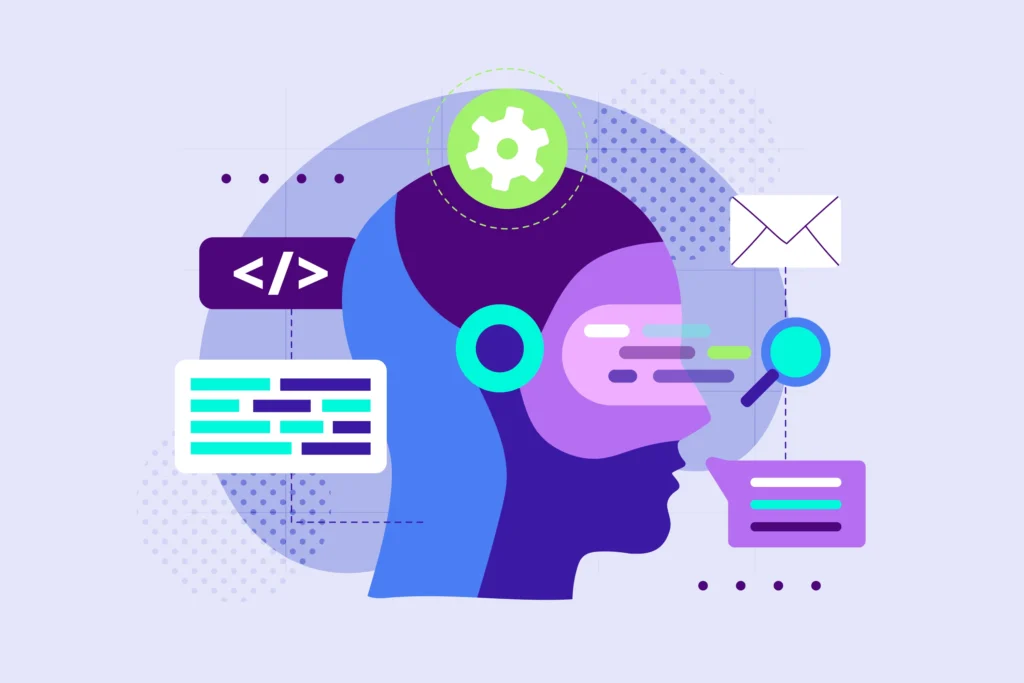
One of the most powerful applications of AI in digital marketing is its ability to deliver highly personalized experiences at scale. Traditional marketing relied on broad audience segments, but digital marketing with AI allows brands to target individuals based on their real time behavior, interests, and needs.
Here’s how AI enhances personalization and targeting:
1. Dynamic Content Delivery
AI can analyze user data and behavior to serve personalized content—such as blog articles, product recommendations, or homepage banners—based on a user’s location, device, and preferences.
2. Behavioral Targeting
By tracking browsing history, click patterns, and purchase behavior, AI digital marketing tools help businesses create detailed user profiles. These insights allow for more precise ad targeting and messaging.
3. Email Personalization
AI optimizes email marketing by personalizing subject lines, content, and send times. This leads to higher open rates, click through rates, and ultimately better ROI.
4. Product Recommendations
Platforms like Amazon and Shopify use AI for digital marketing to suggest products users are most likely to buy—based on browsing behavior, previous purchases, and similar customer profiles.
5. Real Time Adaptation
AI algorithms can adapt campaigns in real time, showing different versions of ads or web pages to different users based on their actions—even mid session.
By using AI to personalize at a deeper level, marketers not only improve engagement but also build trust and long term loyalty—proving once again the critical role of AI in marketing.
We use these same personalization techniques in our social media marketing services to help businesses boost engagement and connect with their audience more effectively.
7. What are the Pros & Cons of AI Digital Marketing?
While AI in digital marketing offers powerful advantages, it’s important to understand both sides of the equation. Like any technology, AI has its strengths—and its limitations. Knowing these will help you use AI digital marketing tools more effectively and responsibly.
Pros of AI in Digital Marketing
1. Increased Efficiency
AI automates time consuming tasks such as data analysis, email segmentation, ad targeting, and more—allowing marketers to focus on strategy and creativity.
2. Enhanced Personalization
With the help of AI for digital marketing, brands can deliver hyper personalized content, offers, and product recommendations to individual users in real time.
3. Smarter Decision Making
AI tools provide deep insights and predictive analytics, helping marketers make data driven decisions that improve campaign performance.
4. Real Time Optimization
AI can instantly analyze live campaign data and make changes—like adjusting bidding strategies or switching ad creatives—on the go.
5. Cost Savings Over Time
Although there may be an initial investment, digital marketing with AI can reduce long term costs by automating repetitive tasks and improving ROI.
Cons of AI in Digital Marketing
1. High Initial Setup Cost
Some advanced AI tools can be expensive to implement, especially for small businesses without large marketing budgets.
2. Lack of Human Creativity
AI can generate content and ideas, but it lacks the emotional intelligence and originality that human marketers bring to storytelling and brand voice.
3. Data Privacy Concerns
Using AI involves collecting and analyzing user data, which raises concerns around privacy, data security, and compliance with laws like GDPR.
4. Over Reliance on Automation
Depending too much on automation can lead to generic messaging and a loss of authentic brand identity if not monitored closely.
5. Skill Gap
Not all marketers are trained in using AI digital marketing tools effectively, which can limit their potential if the right training or team isn’t in place.
When used thoughtfully, the role of AI in marketing is to support—not replace—human creativity and strategy. The key is finding the right balance between automation and authenticity.
The Future of AI in Digital Marketing
The future of AI in digital marketing is not just promising—it’s already unfolding. As technology evolves, AI will continue to revolutionize how businesses attract, engage, and retain customers. From hyper personalized experiences to voice and visual search, the possibilities are expanding fast.
Here are some key trends that will shape the future of digital marketing with AI:
1. Voice and Visual Search Integration
With the rise of smart assistants like Alexa, Siri, and Google Assistant, more users are turning to voice search. AI will help marketers optimize content for voice queries and even image based searches using tools like Google Lens.
2. Hyper Personalization at Scale
In the future, AI digital marketing will move beyond basic personalization. It will allow real time experiences tailored to individual users across all platforms—email, websites, ads, and even in store.
3. AI Generated Video Content
AI tools are now capable of creating short form videos from text or blog content. This opens up opportunities for marketers to repurpose content and boost engagement across platforms like Instagram Reels, YouTube Shorts, and TikTok.
4. Predictive Customer Behavior
The role of AI in marketing will become more proactive than reactive. AI will not just analyze past behavior—it will predict future actions, allowing businesses to address customer needs before they arise.
5. Smarter Chatbots with Emotional Intelligence
Next gen chatbots will be more conversational, empathetic, and capable of handling complex queries. They’ll feel less like machines and more like human assistants.
6. AI Powered Content Strategy
AI will assist in not only creating content but planning what to write, when to publish, and where to promote it for the highest impact.
The future of AI for digital marketing is all about creating smarter, more personalized, and deeply connected customer experiences. Brands that adopt AI early—and wisely—will gain a strong competitive edge.
How to Start Using AI in Your Digital Marketing Strategy
Adopting AI in digital marketing doesn’t have to be overwhelming. Whether you’re running a small business or managing a large brand, you can start small and scale up as you go. The key is to identify areas where AI for digital marketing can save time, boost performance, or enhance personalization.
Here’s a step by step guide to help you get started:
1. Identify Repetitive Tasks
Look at areas where your team spends the most time like writing emails, scheduling social posts, or analyzing data. These are perfect tasks to automate using AI digital marketing tools.
2. Choose the Right AI Tools
Start with easy to use tools like:
- Jasper or ChatGPT for content creation
- Grammarly for AI enhanced writing
- Mailchimp with AI features for email marketing
- SurferSEO for optimizing blog content
Make sure the tool aligns with your business goals and skill level.
3. Start with One Channel
Focus on one area first—such as email automation or content creation—before expanding to other parts of your digital marketing with AI strategy.
4. Train Your Team
Ensure your team understands how the AI tools work. Many platforms offer tutorials, demos, and support to get you started quickly.
5. Monitor Performance and Adjust
AI gives you powerful analytics. Use them to track what’s working, where you’re saving time, and how it’s impacting your ROI. Then, refine your strategy accordingly.
6. Stay Updated
The role of AI in marketing is evolving fast. Follow updates, test new features, and stay flexible as new AI powered opportunities emerge.
Starting small and staying consistent is the best way to build momentum with AI in digital marketing. You don’t need to overhaul your entire digital marketing or social media strategy overnight—just start where it will have the greatest impact.
Conclusion
The impact of AI in digital marketing is undeniable. From automating repetitive tasks to delivering hyper personalized customer experiences, AI is reshaping how businesses connect, communicate, and convert in the digital age.
As you’ve seen throughout this guide, the role of AI in marketing goes far beyond just saving time—it empowers marketers to make smarter decisions, increase ROI, and stay ahead of the competition. Whether you’re a small business owner or part of a larger team, integrating AI for digital marketing into your strategy is no longer optional—it’s essential.
Start small, experiment with the right tools, and keep learning as you go. The future of digital marketing with AI is full of potential—and it’s available to those who are ready to take the first step.
FAQs
How is AI used in digital marketing today?
AI is used in many areas including chatbots, content creation, social media scheduling, ad targeting, SEO, and customer segmentation. Tools like Jasper, ChatGPT, and SurferSEO are popular for enhancing AI digital marketing workflows.
Can small businesses use AI in marketing?
Yes! Many AI tools are affordable and user-friendly. Small businesses can start by using AI for email automation, content suggestions, or social media management, and scale their efforts as they grow.
Can AI be used in social media marketing?
Yes, AI helps schedule posts, generate captions, monitor performance, and even engage with comments using smart chatbots. It’s a key part of many modern social media marketing strategies.
What skills do marketers need to work with AI tools?
While technical knowledge helps, most modern AI digital marketing tools are user-friendly. Skills in data analysis, content strategy, and basic tool training are usually enough to get started effectively.
Are there risks to using AI in digital marketing?
Risks include over-reliance on automation, data privacy issues, and generic content if not used wisely. That’s why combining human creativity with AI digital marketing tools is the best approach.

